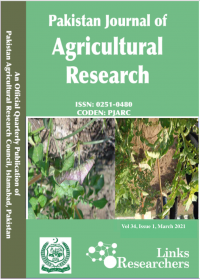Laboratory Evaluation of Selected Botanical and Microbial Formulations against Khapra Beetle Trogoderma granarium Everts (Coleoptera: Dermestidae)
Laboratory Evaluation of Selected Botanical and Microbial Formulations against Khapra Beetle Trogoderma granarium Everts (Coleoptera: Dermestidae)
Hassan Ali1, Abu Bakar Muhammad Raza1, Muhammad Zeeshan Majeed1* and Muhammad Imran Hamid2
ABSTRACT
Khapra beetle, Trogoderma granarium Everts (Coleoptera: Dermestidae), is an economically important stored grain and quarantine pest. It has developed considerable resistance to phosphine and other frequently used grain protectants. This situation necessitates looking for alternate biorational control options such as botanical and microbial insecticides. This in-vitro study assessed the anti-insect potential of four local plant extracts and two promising microbial formulations against 5th instar larvae of T. granarium. Toxicity bioassays revealed that the extracts of Citrus reticulata L. and Solanum nigrum L. were most effective against T. granarium causing significantly higher larval mortality (35 – 40%) than other botanical treatments. Similarly, the highest concentration (15%) of C. reticulata extract exhibited maximum repellency (88%) of larvae, followed by Datura stramonium (84%) and Azadirachta indica (79%) at 24 h post-exposure. Regarding bioassays with microbial insecticides, maximum mean mortality of larvae (i.e. 42.6 and 46.1%) were exhibited by the highest concentration of Bacillus thuringiensis (18000 CFUs mg-1) and Lecanicillium lecanii (1.0 × 109 conidia g-1) recorded at 5th and 9th day of bioassay, respectively. Based on overall results, the local botanical extracts, particularly peel extract of C. reticulata and leaf extract of S. nigrum and microbial formulations of B. thuringiensis and L. lecanii are recommended to the indigenous farmers as biorational options for the management of T. granarium and other stored grain insect pests.
To share on other social networks, click on any share button. What are these?






